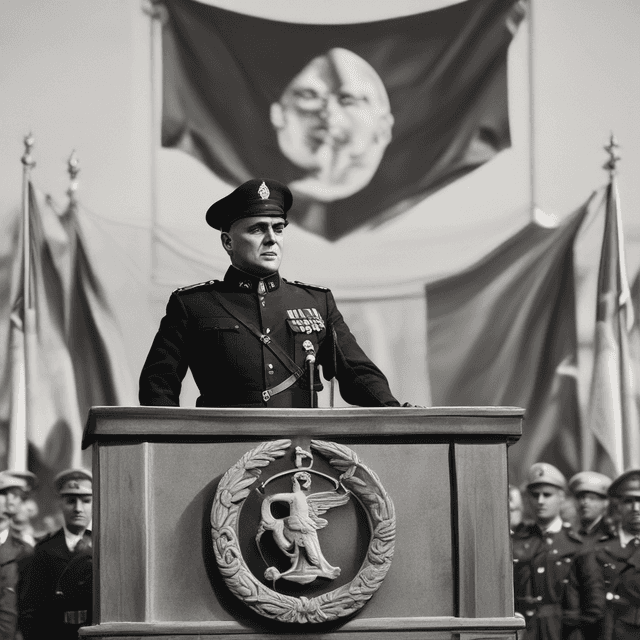
| Leader | Benito Mussolini |
| Subject | Fascist Italy in an alternate World War II timeline |
| Timeframe | Alternate World War II |
| Key events | Fascist Italy seizes power and establishes an authoritarian regime • Italy remains highly aggressive and imperialistic, but does not escalate to the same level of genocidal atrocities as Nazi Germany • The absence of the Nazi threat drastically alters the course of World War II and the subsequent geopolitical landscape • Potential significant consequences for technological progress and the nuclear arms race |
| Consequences | Altered course of World War II and geopolitical landscape • Potential impacts on technological progress and nuclear arms race |
| Government type | Authoritarian regime |
| Political party | National Fascist Party |
In the history of this timeline, the major fascist movement that arose in the mid-20th century was not centered in Germany, but rather in Italy under the leadership of Benito Mussolini and the National Fascist Party. While still highly aggressive and authoritarian, the Italian Fascist regime did not reach the same extremes of genocide, racial ideology, and global domination as the Nazi regime in our own timeline.
In the aftermath of World War I, Italy faced severe economic and political instability. Amid this turmoil, the National Fascist Party under Benito Mussolini rose to prominence, capitalizing on nationalist, anti-communist sentiments. Mussolini became prime minister in 1922 and quickly consolidated power, establishing a totalitarian one-party state.
The Italian Fascist regime was characterized by extreme nationalism, a cult of personality around Mussolini, and a corporatist economic model. It also pursued an imperialist foreign policy, seeking to expand Italy's territorial control and influence in the Mediterranean region.
The core tenets of Italian Fascism centered around the glorification of the Italian nation, a rejection of democracy and individualism, and the establishment of a powerful, centralized state. Mussolini and his regime promoted a version of Italian exceptionalism and sought to revive the grandeur of the Roman Empire.
While the Fascists were highly repressive and intolerant of political opposition, their ideology did not embrace the same extreme racial antisemitism and genocide that was central to Nazi ideology in our timeline. Persecution of minorities did occur, but not on the same industrialized, genocidal scale.
Mussolini's Fascist government was highly aggressive in pursuing territorial expansion, seeking to establish Italy as a dominant regional power. This led to the invasion and occupation of Albania in 1939 as well as the annexation of portions of North Africa. However, the Fascists did not attempt the same level of large-scale military conquests seen in our world's World War II.
When World War II broke out, Italy allied itself with Germany and Japan, though the Fascist regime was not as tightly integrated with its Axis partners as the Nazis were. The Italian military met with mixed success on various fronts, ultimately suffering significant defeats that eroded public support for the war effort.
Without the extreme threat of Nazi Germany, the Allied powers did not coalesce to the same degree as in our timeline. The war unfolded in a more fragmented manner, with the United States, Soviet Union, United Kingdom, and other powers pursuing their own strategic interests.
The absence of a dominating Nazi regime fundamentally reshaped the postwar geopolitical landscape. The Soviet Union emerged as a global superpower, but faced a more divided Western Allies. This contributed to a more protracted and unstable Cold War dynamic, as the world grappled with the emerging threat of nuclear weapons and competition for influence.
The different trajectory of the 20th century in this timeline likely had significant impacts on the pace and direction of technological progress, including in areas like nuclear technology, rocketry, and computer science. Without the same wartime imperatives and military-industrial dynamics, the nuclear arms race and space race may have unfolded very differently.